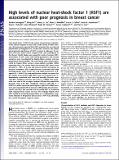| dc.contributor.author | Santagata, Sandro | |
| dc.contributor.author | Mendillo, Marc L. | |
| dc.contributor.author | Whitesell, Luke | |
| dc.contributor.author | Lindquist, Susan | |
| dc.contributor.author | Hu, Rong | |
| dc.contributor.author | Lin, Nancy U. | |
| dc.contributor.author | Collins, Laura C. | |
| dc.contributor.author | Hankinson, Susan E. | |
| dc.contributor.author | Schnitt, Stuart J. | |
| dc.contributor.author | Tamimi, Rulla M. | |
| dc.contributor.author | Ince, Tan A. | |
| dc.date.accessioned | 2012-10-18T17:51:55Z | |
| dc.date.available | 2012-10-18T17:51:55Z | |
| dc.date.issued | 2011-09 | |
| dc.date.submitted | 2011-07 | |
| dc.identifier.issn | 0027-8424 | |
| dc.identifier.issn | 1091-6490 | |
| dc.identifier.uri | http://hdl.handle.net/1721.1/74089 | |
| dc.description.abstract | Heat-shock factor 1 (HSF1) is the master transcriptional regulator of the cellular response to heat and a wide variety of other stressors. We previously reported that HSF1 promotes the survival and proliferation of malignant cells. At this time, however, the clinical and prognostic significance of HSF1 in cancer is unknown. To address this issue breast cancer samples from 1,841 participants in the Nurses’ Health Study were scored for levels of nuclear HSF1. Associations of HSF1 status with clinical parameters and survival outcomes were investigated by Kaplan–Meier analysis and Cox proportional hazard models. The associations were further delineated by Kaplan–Meier analysis using publicly available mRNA expression data. Our results show that nuclear HSF1 levels were elevated in ∼80% of in situ and invasive breast carcinomas. In invasive carcinomas, HSF1 expression was associated with high histologic grade, larger tumor size, and nodal involvement at diagnosis (P < 0.0001). By using multivariate analysis to account for the effects of covariates, high HSF1 levels were found to be independently associated with increased mortality (hazards ratio: 1.62; 95% confidence interval: 1.21–2.17; P < 0.0013). This association was seen in the estrogen receptor (ER)-positive population (hazards ratio: 2.10; 95% confidence interval: 1.45–3.03; P < 0.0001). In public expression profiling data, high HSF1 mRNA levels were also associated with an increase in ER-positive breast cancer-specific mortality. We conclude that increased HSF1 is associated with reduced breast cancer survival. The findings indicate that HSF1 should be evaluated prospectively as an independent prognostic indicator in ER-positive breast cancer. HSF1 may ultimately be a useful therapeutic target in cancer. | en_US |
| dc.description.sponsorship | National Cancer Institute (U.S.) (Grant R01-CA146445-01) | en_US |
| dc.description.sponsorship | Howard Hughes Medical Institute | en_US |
| dc.language.iso | en_US | |
| dc.publisher | National Academy of Sciences | en_US |
| dc.relation.isversionof | http://dx.doi.org/10.1073/pnas.1115031108 | en_US |
| dc.rights | Article is made available in accordance with the publisher's policy and may be subject to US copyright law. Please refer to the publisher's site for terms of use. | en_US |
| dc.source | PNAS | en_US |
| dc.title | High levels of nuclear heat-shock factor 1 (HSF1) are associated with poor prognosis in breast cancer | en_US |
| dc.type | Article | en_US |
| dc.identifier.citation | Santagata, S. et al. “High Levels of Nuclear Heat-shock Factor 1 (HSF1) Are Associated with Poor Prognosis in Breast Cancer.” Proceedings of the National Academy of Sciences 108.45 (2011): 18378–18383. ©2011 by the National Academy of Sciences | en_US |
| dc.contributor.department | Massachusetts Institute of Technology. Department of Biology | en_US |
| dc.contributor.department | Whitehead Institute for Biomedical Research | en_US |
| dc.contributor.approver | Lindquist, Susan | |
| dc.contributor.mitauthor | Lindquist, Susan | |
| dc.relation.journal | Proceedings of the National Academy of Sciences | en_US |
| dc.eprint.version | Final published version | en_US |
| dc.type.uri | http://purl.org/eprint/type/JournalArticle | en_US |
| eprint.status | http://purl.org/eprint/status/PeerReviewed | en_US |
| dspace.orderedauthors | Santagata, S.; Hu, R.; Lin, N. U.; Mendillo, M. L.; Collins, L. C.; Hankinson, S. E.; Schnitt, S. J.; Whitesell, L.; Tamimi, R. M.; Lindquist, S.; Ince, T. A. | en |
| dc.identifier.orcid | https://orcid.org/0000-0003-1307-882X | |
| mit.license | PUBLISHER_POLICY | en_US |
| mit.metadata.status | Complete | |
